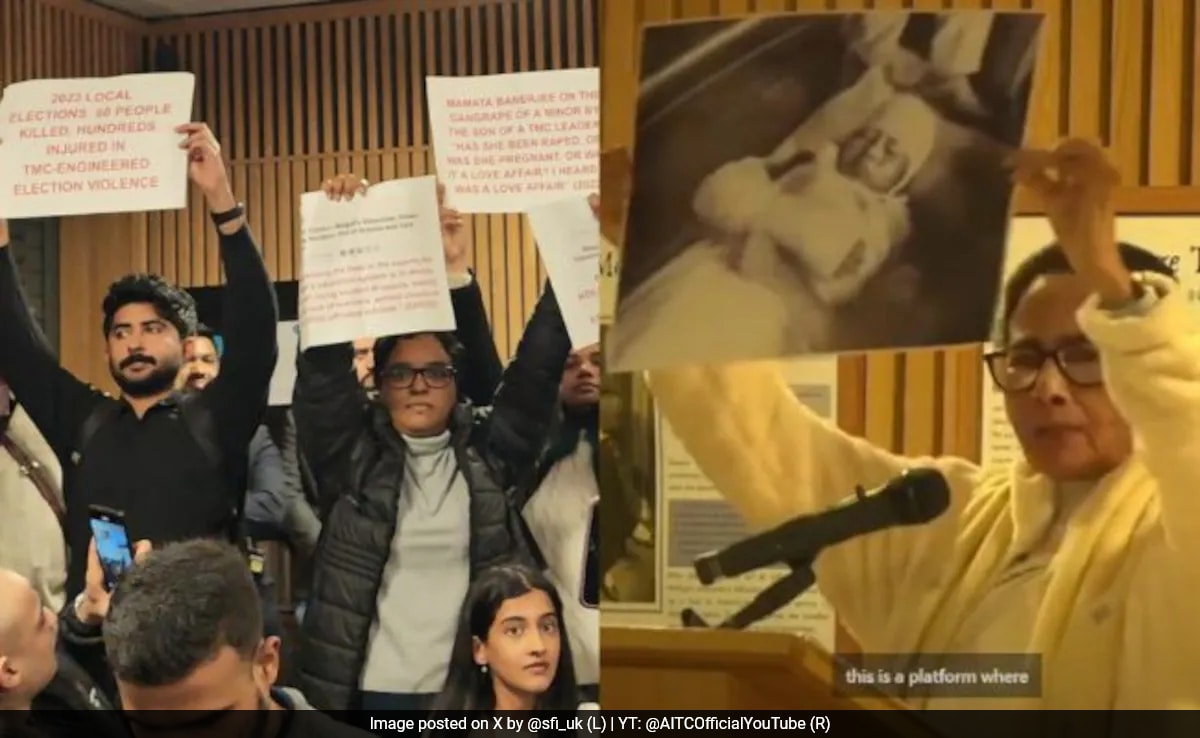West Bengal CM Mamata Banerjee Confronted by Student Demonstrators while Defending Her Policies at Kellogg College
West Bengal Chief Minister Mamata Banerjee found herself at the center of a heated protest during her first address at the prestigious Kellogg College of Oxford University on Thursday, March 27, 2025. The confrontation involved a group of students from the UK unit of the Communist Party of India (Marxist) known as the Students’ Federation of India (SFI). The demonstrators showed up armed with placards that criticized Banerjee for various issues, including alleged violence during the 2023 panchayat elections and the sexual assault of a minor girl. The ongoing controversy surrounding the Chief Minister’s past comments on societal interactions was also highlighted, posing questions about her credibility and governance.
The protest unfolded as Banerjee began her speech, where she attempted to outline her achievements in social development. However, the SFI-UK seized the moment to voice their concerns against her government, demanding evidence for her claims. “We opposed her blatant lies by asking her for evidence of the social development she claims to pioneer. Instead of allowing us to peacefully express our opinions, the police were called,” stated SFI-UK in a tweet following the demonstration.
Despite the tension, Banerjee managed to maintain her composure and even welcomed the protesters by saying, “You are welcoming me, thank you. I will feed you sweets.” The atmosphere, filled with both criticism and her attempts at humor, underscored the complexities of political discourse in today’s environment.
Addressing Allegations and Promoting Democratic Dialogue
As the tension escalated, several students began to question the Chief Minister over the RG Kar rape case and other issues concerning governance. In a somewhat defiant stance, she encouraged the students to speak out, stating, “Please raise your voice. It is a democracy. Please raise your voice. I’ll listen. I will listen carefully.” In doing this, she attempted to frame the dialogue as a crucial part of democratic engagement, despite the backdrop of angry protests.
Mamata Banerjee, while addressing the media, emphasized that the investigation into the alleged assault is currently managed by the central government, thus rendering the state government without any involvement. “You know the case is sub-judice, and the central government has taken over. It is not with us. Please don’t do politics here,” she asserted, attempting to divert attention away from the contentious political exchanges occurring during her address.
In a dramatic twist of the discourse, one student accused a Trinamool Congress leader of intimidation, claiming that he had threatened them. Banerjee, while acknowledging the protester’s concerns, rebutted the claims, stating, “You are lying.” This confrontational exchange highlighted the existing mistrust and animosity between her administration and the opposition factions.
Past Trauma and Current Political Landscape
During the address, Banerjee poignantly highlighted her own political history by revealing a black and white photograph, which she claimed depicted her injuries from an assault by a CPI(M) youth worker back in 1990. She recounted this traumatic experience to underscore the violence she argues has been directed at her by the left-wing factions over the years. “I was about to die. These are your atrocities,” she claimed emphatically, calling out the historical context of violence in West Bengal politics.
Banerjee further cautioned that the protest methods employed by the left to disrupt her speeches are indicative of a larger pattern. “This is the habit of the left to create chaos wherever I go,” she declared, arguing that such tactics reflect poorly not just on her but on the institutions that host these events.
While trying to foster an image of unity, she stated, “I am for Hindu, Muslim, Sikh, Isai. I am for all. I am for unity.” However, many argue that the social fabric of West Bengal remains deeply divided, raising questions about her claims of inclusivity and respect for all communities.
In a statement that has since gone viral on social media, Banerjee adopted an endearing yet fierce metaphor by saying, “Didi walks like a Royal Bengal Tiger. If you can catch me, catch me!” This assertion played into her political persona, which aims to portray both strength and resilience amidst adversity.
Political Impact and Public Perception
The aftermath of Banerjee’s confrontation with the SFI-UK has sparked discussions across various platforms regarding the implications of her remarks and the protests. The social media response, particularly from Trinamool Congress supporters, positioned Banerjee as an indomitable figure. A tweet from the party’s official account proclaimed, “She doesn’t flinch. She doesn’t falter. The more you heckle, the fiercer she roars.”
While Banerjee’s supporters celebrate her as a strong leader who faces challenges head-on, her critics argue that her governance style is fraught with unresolved allegations of corruption and violence. The protests in Oxford serve as a reminder of the broader political unrest in West Bengal, where issues of governance, social justice, and violence dominate the discourse.
As per the report by NDTV, these protests at Oxford symbolize not just the dissent within Indian politics but also represent a growing global engagement with India’s political landscape. The formation of student organizations like SFI-UK illustrates the transnational dimensions of political activism, highlighting how the youth can influence international perceptions of governance in their homeland.
While the demonstration at Kellogg College perhaps illustrates the power of student movements within the diaspora, it also raises critical questions about the future of political dialogue and the avenues available for dissent in a democratic society.
For readers interested in exploring the ongoing political situation in West Bengal and the implications of such protests, further information can be found in related articles: Hindustan Times and The Hindu.
DISCLAIMER
We have taken every measure to ensure that the information in this article and on our social media platforms is accurate, verified, and obtained from reliable sources. For feedback or complaints, please contact us at info@hamslive.com.


